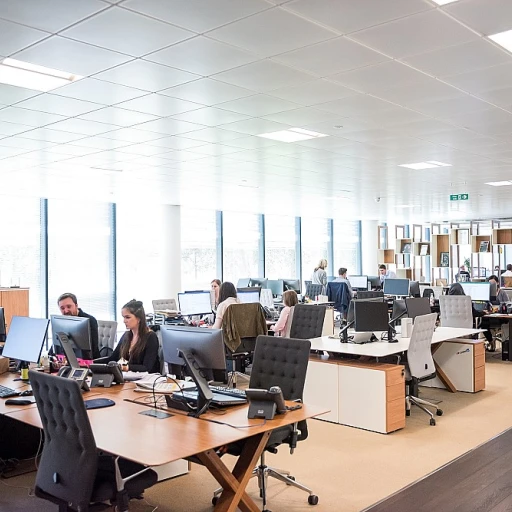
Understanding the Role of a Skills Development Facilitator
The Integral Role of Skills Development Facilitators in Organizations
The impact and success of a company largely hinge on its ability to continually enhance the capabilities of its workforce. At the heart of this endeavor is the Skills Development Facilitator (SDF), a pivotal figure in guiding companies through the dynamic landscape of skills development and employee growth. More than just intermediaries, these facilitators are essential in aligning workforce skills with organizational goals, ensuring compliance, and fostering a culture of continuous improvement. Skills Development Facilitators are responsible for implementing comprehensive skills plans that are tailor-made to fit the unique needs of a business. By collaborating with the Education, Training and Development Practices Sector Education and Training Authority (ETDP SETA), they help companies design relevant courses and learning interventions that promote career development and maximize employee potential. A crucial part of the SDF’s role involves managing annual training reports and maintaining compliance with legislative frameworks. This requires meticulous planning and execution of training programs and ensuring that the outcomes align with both organizational growth strategies and employees' career aspirations. Additionally, these facilitators are tasked with balancing skill utilization across all levels of the organization, ensuring employment equity, and addressing any skills gap through structured training development. By doing so, they not only enhance individual employee careers but also contribute significantly to the overall growth trajectory of the organization. Enhancing leadership skills through effective management coaching further augments the role of an SDF, as leadership plays an indispensable role in nurturing a conducive learning environment.Key Skills and Competencies Required
Essential Skills and Attributes for Success
In the world of skills development facilitation, possessing a unique blend of competencies is crucial to driving organizational success. A skills development facilitator (SDF) plays a pivotal role in identifying and addressing learning and training needs within a company. This requires a strong combination of skills, ranging from effective communication to strategic planning and beyond.
Here are some key skills and attributes that are vital for an SDF:
- Communication and Interpersonal Skills: Facilitators need to effectively communicate with employees at all levels, understanding their career development needs and aligning them with organizational goals.
- Project Management: Managing and executing training programs, including annual training plans and courses, requires strong project management abilities.
- Strategic Thinking: An SDF must align skills development initiatives with the company's overall objectives, ensuring compliance and maximizing training outcomes.
- Analytical Skills: Evaluating training reports and outcomes to measure the success of learning interventions is essential for continuous improvement.
- Knowledge of Regulatory Requirements: Staying informed about employment equity, workplace skills compliance, and education training laws is crucial for ensuring that the development plan adheres to relevant standards.
For those wanting to further enhance these skills, pursuing effective learning strategies can be incredibly beneficial. By continuously developing these competencies, an SDF not only facilitates career growth for employees but also contributes to the overall development of the company.
Strategies for Effective Communication in HR
Optimizing Conversations for Skills Expansion
Effective communication is a cornerstone for Skills Development Facilitators aiming to empower employees through comprehensive training programs. By leveraging several strategic approaches, SDFs can ensure that workplace skills training is not only conducted smoothly but also leads to substantial and tangible outcomes.
Firstly, it’s crucial for facilitators to engage in clear and concise communication when outlining the goals and benefits of training development courses to employees. Establishing a mutual understanding of the skills plan helps align both the company’s and the employee’s expectations. This alignment becomes the foundation for effective training interventions that facilitate career growth while ensuring compliance with employment equity standards.
- Active Listening: SDFs should prioritize listening to employees’ feedback and concerns. This feedback helps tailor the training programs to better fit the learners' needs, leading to more effective learning outcomes.
- Providing Context: Explaining how specific skills development programs contribute to both individual career development and organizational growth makes the learning process more relevant and engaging.
- Utilizing Feedback Loops: Continuous improvement is achieved through regular assessment, thereby allowing SDFs to adjust the training plan effectively.
Moreover, fostering a culture that encourages education and continuous learning is essential for any business aiming for long-term success. This culture encourages participation in annual training and certification courses necessary for ETDP SETA compliance and beyond, enriching both individual and organizational knowledge bases.
SDFs also face challenges when disseminating new information. Overcoming these requires adaptability and the capability to convey complex information in simple terms. Whether it’s through the adaptation of digital platforms for e-learning to better reach remote employees or orchestrating interactive learning sessions that encourage proactive participation, the mode of communication can significantly influence the impact of training development interventions in the workplace.
To summarize, the role of communication in skills development goes beyond simple message conveyance. It forms the backbone of effective development training, fostering a productive and skilled workforce that drives organizational success.
Challenges Faced by Skills Development Facilitators
Overcoming Communication Obstacles in Skills Development Facilitation
In the dynamic world of skills development, facilitators often encounter challenges that impede efficient training and learning within the workplace. Understanding and addressing these obstacles is essential for skills development facilitators (SDFs) to excel in their roles and drive successful outcomes in employee development. SDFs must navigate an array of challenges, including:- Adapting to Diverse Learning Styles: Each employee possesses unique learning preferences. Facilitators need to adeptly deliver training programs that cater to visual, auditory, and kinesthetic learners, ensuring inclusivity and maximized skill acquisition. Tailoring courses to meet these varying needs can significantly enhance workplace skills.
- Ensuring Compliance with Educational Standards: Development facilitators are tasked with adhering to national and industry-specific guidelines, such as those set by the Sector Education and Training Authority (SETA). Maintaining compliance requires careful planning and continuous improvement in course delivery to match the evolving standards in education training.
- Bridge the Gap between Theory and Practical Application: One of the significant hurdles is ensuring that theoretical knowledge translates into practical skills within the company. Facilitating career development involves creating realistic scenarios in training that mirror workplace challenges, thus enhancing employee readiness.
- Managing Resource Limitations: Often, businesses may encounter budget constraints that limit the scope of training programs. Efficient resource management and prioritization in the skills plan allow facilitators to focus on high-impact learning interventions that can propel employees toward career development goals.
- Navigating Organizational Dynamics: SDFs sometimes face resistance or lack of engagement from staff or leadership. Building robust communication channels and leveraging influence within the organization to foster a culture of continuous learning is vital for long-term success.
- Delivering Impactful Training Reports: A development facilitator is expected to provide insightful training reports that evaluate course efficiencies and highlight areas for improvement. Regular feedback loops and transparent communication strengthen the alignment of training initiatives with organizational growth objectives.
The Impact of Skills Development on Organizational Growth
Driving Organizational Success through Skills Development
The influence of skills development on organizational growth cannot be overstated. As businesses strive to remain competitive, the role of development facilitators becomes pivotal in ensuring that employees are equipped with the necessary skills and competencies. By aligning training programs with the company's strategic objectives, facilitators sdf play a crucial role in fostering a culture of continuous improvement and innovation.
Successful organizations understand that investing in skills development leads to a more competent workforce, enhancing not only individual career development but also overall company performance. By implementing annual training plans and learning interventions, businesses can ensure that workplace skills are kept up to date, fostering an environment where employees can thrive and contribute to business outcomes.
Facilitating Career Growth and Compliance
Development facilitators are essential in facilitating career progression for employees. By designing customized courses and programs, they provide avenues for personal and professional growth. Additionally, they ensure compliance with employment equity and SETA (Sector Education and Training Authority) requirements, bolstering the organization's standing both in terms of regulatory adherence and ethical standards.
Through effective skills development, companies can better adapt to industry changes and technological advances, ensuring they remain relevant in a rapidly evolving marketplace. Training development and development training programs are devised to match the dynamic nature of the business landscape, allowing organizations to harness employee potential effectively.
Promoting Employee Engagement and Retention
An engaged workforce is more likely to be productive and committed to the company's goals. By providing employees with opportunities for education and training, companies can enhance job satisfaction and reduce turnover rates. Skills development programs, therefore, serve as a powerful tool for facilitating career advancement, ensuring employees feel valued and motivated to contribute to workplace success.
Future Trends in Skills Development Facilitation
Emerging Trends in Skills Facilitation for Tomorrow's Workforce
As we look towards the future of skills development and facilitation, it's evident that this landscape is evolving rapidly to meet the dynamic needs of both businesses and their employees. Here are some key trends that development facilitators need to be aware of to stay ahead in this ever-changing field:- Integration of Technology: Digital platforms and tools are becoming central to the education and training process. Facilitators are using technology to deliver training and manage compliance, making learning more accessible and engaging.
- Personalized Learning Paths: With a focus on employee career development, there's a shift towards personalized training programs. This means creating tailored learning interventions that align with an individual's career development plan, thus enhancing workplace skills and outcomes.
- Focus on Continuous Learning: Professional growth is now seen as a continuous journey rather than a destination. Facilitators play a critical role in implementing continuous improvement strategies and encouraging employees to engage in annual training and courses that promote professional development.
- Emphasis on Soft Skills Development: In addition to technical skills, there's a growing recognition of the importance of soft skills such as communication, problem-solving, and adaptability. Skills development facilitators are increasingly incorporating these into training development plans.
- Sustainability and Ethical Practices: As companies strive to align with global sustainability goals, training programs are incorporating ethical considerations and promoting practices that contribute to a sustainable future, which is supported by initiatives like employment equity and compliance with seta standards.













